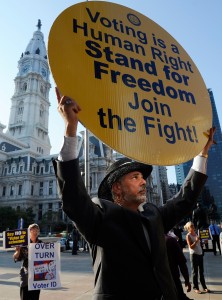
Jay Kohn, of Morristown, NJ, holds a sign during the NAACP voter ID rally to demonstrate the opposition of Pennsylvania’s new voter identification law, Thursday, Sept. 13, 2012, in Philadelphia. (AP Photo/Michael Perez)
Pennsylvanians are still waiting for a final verdict in the case against the state’s strict new voter ID law, which could affect as many as 750,000 mostly elderly and minority voters in a major swing state.
On Tuesday, the state’s Supreme Court declined to issue an injunction blocking the law, but ordered a lower court to reconsider its decision to uphold the law. Unlike the lower court’s much-derided ruling, the Supreme Court’s decision asserts that voting is a fundamental right and that if qualified citizens can’t vote, “the integrity of the upcoming General Election will be impaired.”
When the case against the law was heard by the lower court back in August, the state had just agreed to issue emergency ID cards to registered voters who lacked acceptable photo ID, but the process of distributing those cards had not yet begun. The state Supreme Court has asked the lower court to re-assess “in light of the experience since the time the cards became available” on August 27th. In that time, the state’s department of transportation has issued approximately 9,000 new cards for voting purposes. That’s an average of about 3,000 a week. Even the state’s conservative estimate that nearly 100,000 eligible voters lack the proper ID would mean issuing 30,000 cards a week from now until the election. Civil rights advocates estimate that nearly 750,000 registered Pennsylvania voters lack photo ID.
The Supreme Court has set a high bar for the lower court’s decision, expected on or before October 2 — the judge must be convinced that no voter will be disenfranchised on account of the new voter ID law, despite the slow trickle of cards being issued; otherwise, the court is obliged to order an injunction.

